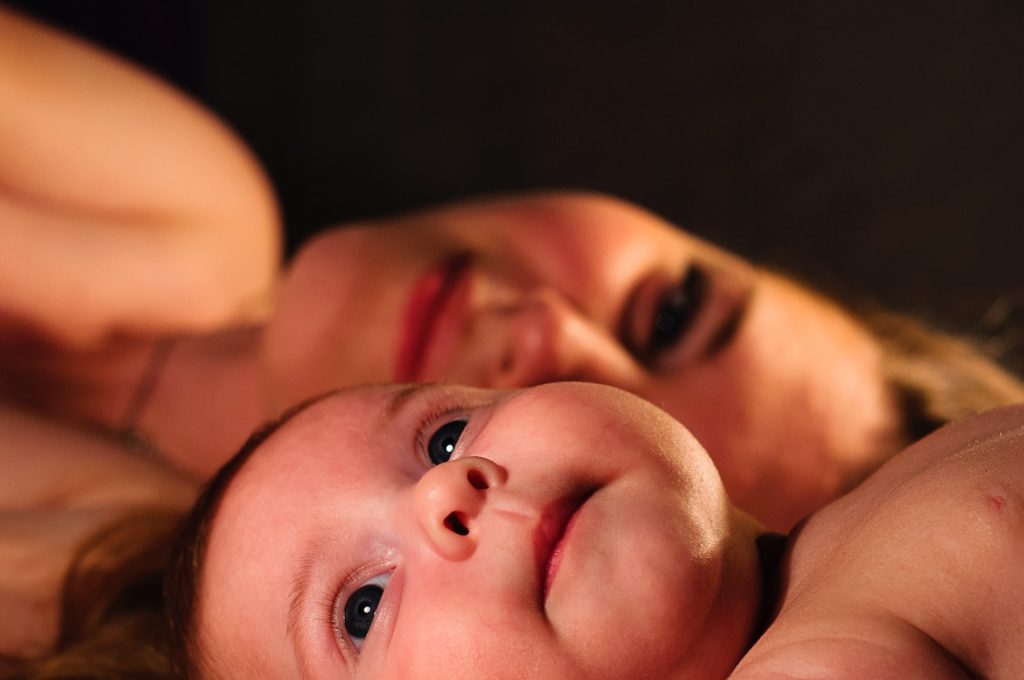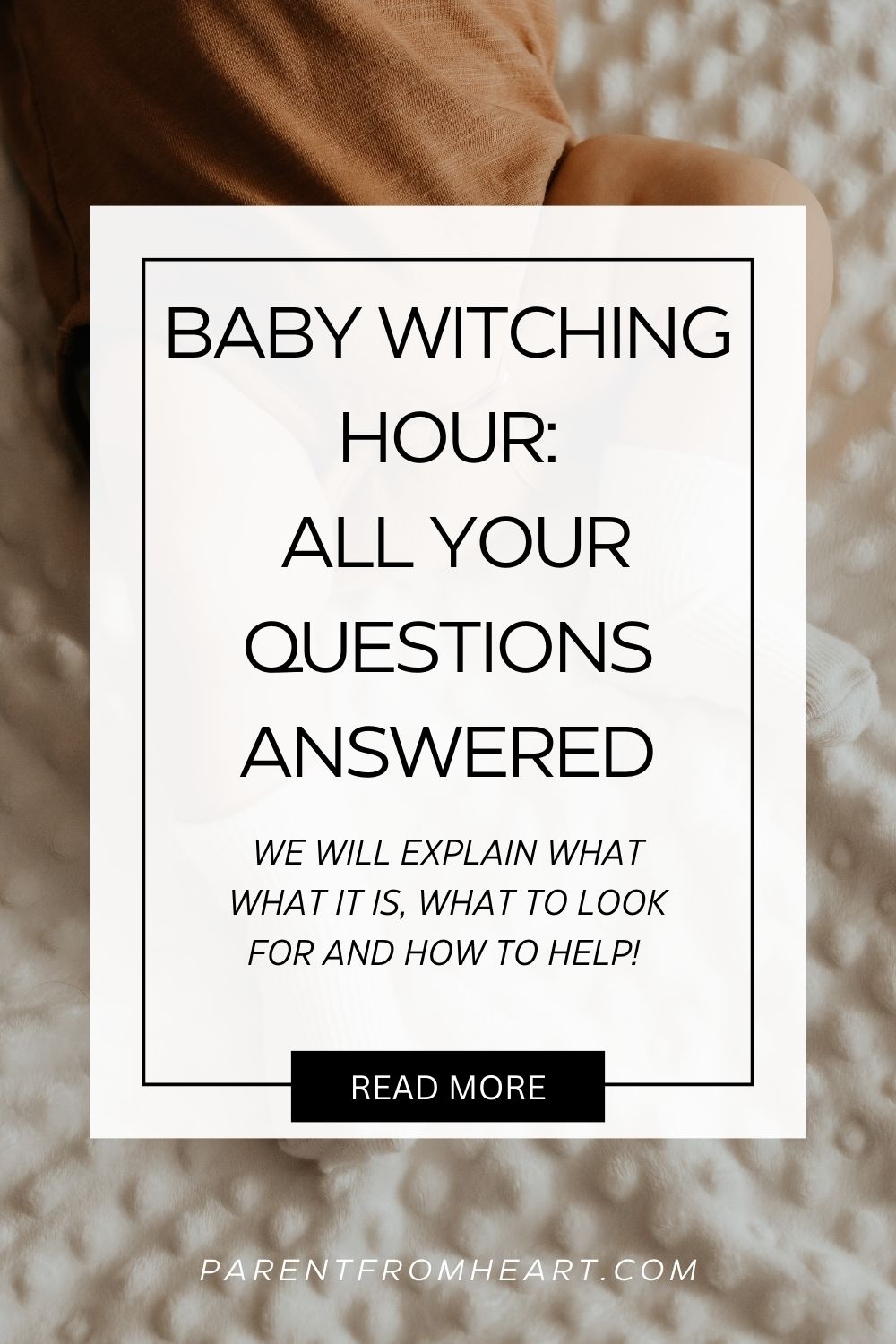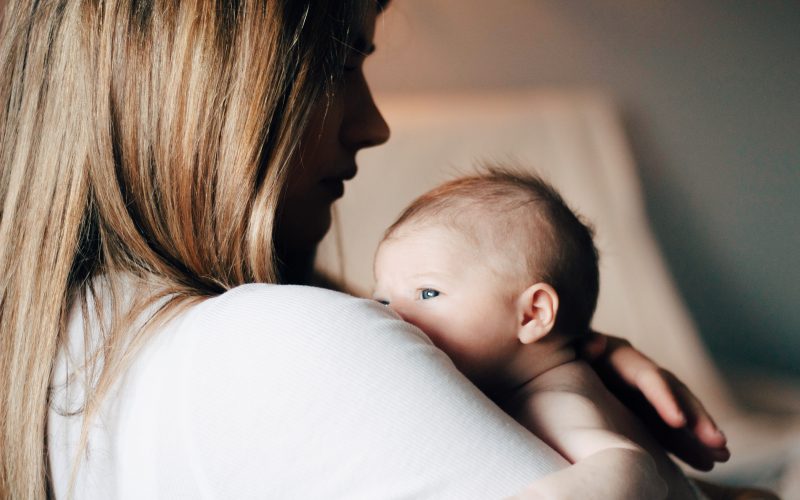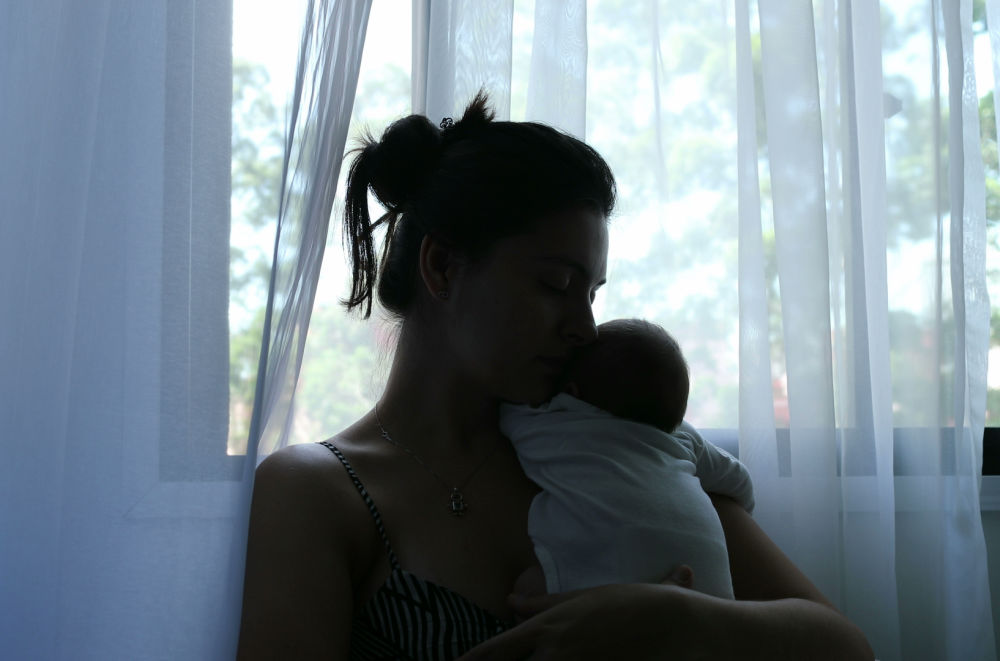Table of Contents
Witching hour for a baby, contrary to what you may think about the term, doesn’t involve any kind of magic, nor does it begin at 3 a.m. It is the dreaded time of day—usually in the evenings—when a previously content and quiet baby becomes inexplicably, inconsolably fussy.
During this time, it will seem like your baby can’t settle for just one thing. You would probably take the newborn witching hour crying fit as a hunger cue. But then, when you give some milk, your baby pulls away to sleep after only a minute of feeding. Ten minutes later, the crying starts again and you change the diaper. That seems to settle things down—until it doesn’t.
This is all a normal part of any baby’s development; though, for some reason, it doesn’t affect all babies. But if your baby is going through it, you’ll have a rough idea of when and what time witching hour happens. It usually takes place between 5 and 11 p.m. every day for a three-month period, on average. The crying could go on for a couple of hours every night, starting from when your baby is two to three weeks old. By six to eight weeks, the fussiness and crying could peak. It all winds down around the three- or four-month mark.

How to tell if it’s witching hour, not colic
From a distance, the irritability and crying that herald witching hour and colic seem the same. But when you look closely, there are marked differences that distinguish one baby crying phenomenon from the other.
During witching hour, newborns become restless and fussy around the same time every day, usually in the early evenings, for a period of about two months. They wriggle, cry, and fuss and nothing you do can console them.
However, your baby’s constant crying and fussing may also be a sign that there is something medically wrong. If your baby is experiencing even just one of the following, it’s best to consult a pediatrician: fever, diarrhea, vomiting, and lack of appetite.
How to tell if it’s colic
Like babies going through their witching hour period, babies with colic begin experiencing extreme fussiness a few weeks after birth, which typically fades away after about three months.
Unlike witching hour babies, though, the ones with colic seem to cry more intensely and at different hours of the day for up to three hours at a time. The crying seems to be more than just irritability because it is accompanied by signs that the baby is in pain—arched back, legs tensed up near their abdomen, and frequently changing positions as if uncomfortable.

What causes baby witching hour?
Several factors could contribute to a newborn being fussy at night. See if you can troubleshoot your baby’s crying to pin down the actual reason for their fussiness. Remember that, often, you might not be able to tell exactly why your baby is crying during witching hour. The important thing is that you give your baby whatever support is needed.
Overstimulation
Newborns aren’t able to self-soothe yet. When they have a busy and noisy day during which they experience an avalanche of new sensations, emotions, and activities, they frequently have a hard time winding down. When activities around them increase to a level that causes stress, their bodies will secrete the hormone epinephrine, making it even harder to calm them. So they do one of the few things they know how to do at this point in their life: cry.
Hunger due to growth spurts
Sometimes, mom’s breastmilk supply runs low—a temporary supply fluctuation that is a normal occurrence during periods of rapid growth. When this happens, a baby might get frustrated and cry for more milk or more frequent feedings, which will increase their mother’s milk supply.
A baby may also cluster-feed, which is when they feed frequently at a certain time each day and then go through a long gap without feeding.
These are the effects of a newborn going through a growth spurt. According to Stanford Medicine Children’s Health, most one- to three-month-old babies gain about two pounds each month and grow at a rate of about an inch per month.
All this growing will require increased calories in the form of milk. If mom’s supply isn’t that consistent, baby will have a few things to say about it.
Exhaustion
Do you experience those nights when you’re extremely tired and sleepy but just can’t sleep? Newborns are the same. If they miss a nap and go on throughout the whole day, lapping up life, they can get over-tired. They want to sleep, but they can’t because their brain is still too wired. And because their prefrontal cortex—the part of the brain that regulates emotions—isn’t developed yet, they react to this irritation by crying.
Demand for attention
Witching hour takes place at the end of the day, which is, coincidentally, the busiest time in a home. Dinner is being prepared, older siblings are doing their homework and asking for help, and partners are arriving home from work. A newborn may feel pushed aside (but they would be wrong). Without knowing why, just that they want the attention they’re used to, they make a fuss.

Signs that baby witching hour is coming
Newborn witching hour doesn’t descend on a household without putting out feelers. If you observe your baby closely, especially toward the end of the day, you will probably see one or more signs that the tempest is about to unfold.
Increased crying
A newborn’s mode of communication is crying. If it starts to increase in intensity or frequency for a long stretch, that may mean that witching hour is creeping up.
Clinginess
If parents are at a loss trying to understand what’s going on during witching hour, the baby is even more confused than they are. And since the baby’s comfort zone is in their parents’ arms, they will do their best to stay within this zone—never mind that the provider of this comfort has to prepare dinner.
Sleep cues
Since tiredness is often one of the causes of newborn witching hour, signs of sleepiness may clue you into what’s about to happen. Babies may start rubbing their eyes, with their eyelids slowly turning red from the irritation. They may also start to stare off into nothing, which is a sign that anyone, regardless of age, is sleepy.

Baby witching hour tips for coping
Just because you don’t completely understand what is going on during your baby’s witching hour doesn’t mean you are helpless. There are several things you can do to help calm you and your baby down or at least provide a distraction. The key here is to keep your head about you. Your baby is already crying; you can’t help if you feel a bit irritable, too.
Get some fresh air
Go for a walk with your baby. The fresh air and movement will be a welcome change from being cooped up inside, encouraging your baby to calm down and stop crying. Even scientists agree.
According to a report published in the journal Current Biology, scientists have found that the best way to pacify a crying baby is to take them on a five-minute walk. They call it the transport response: as you carry your baby on a short walk, they calm down. (This strategy works even in the daytime, by the way.)
After you complete the walk, sit holding your baby for another five minutes before laying them down for sleep.
Rule out any problems you can control
Sometimes, the crying jag may not actually be caused by witching hour but by a tummy full of gas, overheating, or other biological reasons. It’s important to tick off the usual probable causes before steeling yourself for a couple hours of tears. Your baby may be in physical discomfort or pain, that’s all.
Is the diaper full? Could there be diaper rash that is chafing against your baby’s wet diaper?
Could your baby be gassy? If you suspect this, place your baby on a flat surface on their tummy. Lift their belly a bit and massage it softly. Alternatively, lay them on their back, lift their legs a bit, and gently move them like a cyclist.
Perhaps your baby is hungry? A full day would make anyone ravenous. Just make sure that when you feed your baby, their head is higher than their belly. Also, when you breastfeed, see to it that your baby has good suction; i.e., they are sucking on the whole areola. If bottle-feeding, tilt the bottle so that the whole nipple is full of milk. Otherwise, your baby could ingest quite a bit of air with their milk.
Could something in their clothes be poking them or making them itch? An ant once got caught in my baby’s onesie. It drove the whole household crazy looking for this pesky little insect.
Does your baby have a fever, maybe? A clogged nose? Diarrhea? These can make any baby fussy and inconsolable. Call your baby’s pediatrician if you notice any signs of illness.
Wear your baby
The period of witching hour is right smack in the middle of the busiest time of the day. Everyone is home, dinner has to be cooked, homework has to be supervised, baths have to be taken, and baby has to be comforted.
That last one can be fixed if you carry baby around in a sling or carrier as you attend to whatever else needs doing. Since your baby is in a constant state of neediness during witching hour, they’ll be happy just to be next to you in the time before bed. They’ll be soothed by your movements. And with your baby constantly within kissing range, you can quickly deal with any crying fits.

Swaddle
Wrapping your baby in a swaddle recreates the environment they had in the womb for nine months before meeting you. It gives them a sense of safety, reassurance, and comfort. For your baby, a properly done swaddle would feel like a big, warm hug.
This video, produced by the University of Pittsburgh Medical Center Magee-Womens Hospital, will teach you how to correctly swaddle your newborn.
Quiet down
Babies caught in the throes of witching hour are, more often than not, overstimulated. Noise would be one of those stimulants. If your baby is inconsolable, take them into a dark, quiet room. With fewer auditory elements around, their brain can quiet down, too.
Some pediatricians would recommend playing white noise on loop to aid your newborn’s sleep. In the same way that white light is a combination of all the colors of light, white noise is a blend of all frequencies of audible sound. A study in 1990 found that when one of two groups of 20 newborns was exposed to white noise, 16 in the white noise group fell asleep within five minutes. In contrast, only 5 of the 20 babies not exposed to white noise fell asleep.
However, in 2021, an article reviewing the available research on the relationship of white noise to sleep was published. After looking at the findings from 38 studies, the reviewers concluded there is not enough quality evidence to support using it as a sleep aid. In fact, playing white noise during sleep might have long-term negative effects. Our bodies, including our auditory system, recuperate as we sleep. If we listen to any kind of repetitive noise during sleep, we might be able to get the rest we need.
Feed your baby on demand, either on the breast or bottle
One of the reasons your baby makes like a banshee during witching hour is that they’re hungry. Growth spurts tend to do that. So feed your baby.
Make sure, though, that they are not receiving too much milk at once. If you have an oversupply of breastmilk, your baby will try to keep up with the fast flow and, in the process, take in too much air. This will often give them gas, compounding the effects of witching hour.
One way to mitigate this is to feed your baby from a reclining position. This gives your baby control over their feeding, allowing them to set the pace. If they get overwhelmed at any point by your milk flow, they can raise their head to catch their breath.
Go on Zen mode
Infants can be mirrors of others’ emotions. In a paper published in 2019, its authors showed that babies are natural empaths, stopping their play and showing concern when they see someone in distress.
It is easy to get flustered and stressed out when you and your baby are deep into witching hour. One way to calm your baby down is to be calm yourself.
In the midst of the crying, stop what you are doing and take a few moments to breathe deeply. If you can, hand your baby to someone else and try the box breathing method, a physiologic calming technique. Inhale over four seconds; hold your breath for four more seconds; exhale through your mouth for four seconds; then wait four seconds before your next inhalation. Repeat three or four times or until you can hear yourself think again.

Give your baby a warm bath
Perhaps your baby just needs some prodding to go to sleep? A warm bath could help set things up for bed.
According to sleep experts, our body temperature rises when we wake in the morning. This gives us the energy to do everything we need to do. As the day moves toward bedtime, our body temperature gradually drops, signaling the body to sleep.
For your crying baby at witching hour, a warm bath is another way to hasten this signal. The higher temperature of the bath relaxes blood vessels, widening them to let more blood flow through, consequently lowering blood pressure. The body temperature will then go down after getting out of the bath. In a more relaxed state, your baby will be in a better position to get drowsy.
Call for reinforcements
Parenthood was never meant to be a solitary thing. A village, it’s been said, is required to raise a child properly (and also to keep parents sane). So when witching hour makes your evenings overwhelming, see if you can tap on your village for help.
Since we know witching hour can last a couple of hours every night for at least a month, rally your troops ahead of time. See if your partner can split the witching hour shift with you on alternate weeks. If there is no partner, ask your parents, siblings, or best friends to relieve you once in a while. They could also just come over for moral support as you focus on calming your baby down.

You are stronger than baby witching hour
Although sometimes it may not seem that way, newborn witching hour is normal and manageable. Pediatricians attribute this long bit of crying jag to your baby having to deal with growth spurts amidst a noisy new world. Your little one can’t help it; witching hour helps them release all this pent-up energy and confusion. Your job is to keep your composure, extend your patience, attend to your baby’s needs, and acknowledge when you need to call for help.
Like this post? Click the image below to share it on Pinterest- Thank you!












